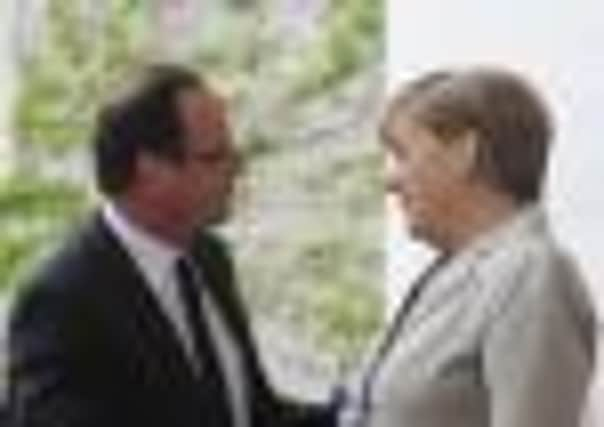Leaders: Greece and the eurozone face only hard choices


If he avoids one, the other will get him. He chose to skirt Scylla as the lesser evil, losing only a few crew members. New French president François Hollande, whose plane was struck by lightning en route to a euro-crisis summit with German chancellor Angela Merkel, may have thought he was on a similarly perilous journey. Indeed, he is and Greece is too, for nothing can be done to get the Greeks out of their terrible dilemma except at great cost.
Staying with the euro means perhaps a decade of financial misery. The Greek government is still spending far more than it earns in tax revenues and further multi-billion bail-outs from the EU will increase the bill even further. Popular will appears to want to keep the euro but to renegotiate the terms of debt repayment to ease the burden. It sounds a reasonable course but, even if Mrs Merkel is to yield to French and Greek demands for a rethink on austerity, renegotiation simply means reducing an extremely heavy load to a very heavy one.
Advertisement
Hide AdAdvertisement
Hide AdExiting the euro has superficial appeal as it would deliver the traditional remedy for a struggling economy – and which is not now available to Greece because of its euro membership – currency devaluation. But the worth of this is highly doubtful. Though Greek exports and holidays by foreigners there would become cheaper, exports and tourism are a small part of its economy. Imports, however, would become much more expensive, hitting already greatly reduced living standards even harder. And whatever government eventually emerges, presumably now from a second election in June, will still have to cut spending and raise taxes.
In or out of the euro, another default on Greek debt now looks inevitable. This, now held mainly by European banks which would lose a significant part of their capital stock, threatens another banking crisis. Yesterday’s statistics that the eurozone recorded no growth in this year’s first quarter were actually greeted as good news (in that there was no downturn) so it is an easy assumption that a Greek default would push Europe back into recession, turning Britain’s double-dip recession into a deeper malaise.
The task, therefore, is to find the least worst option, bearing in mind that the next Greek election may well return Syrzia, the left-wing austerity-rejecting grouping led by the charismatic Alexis Tsipras, to power. Eurozone leaders, especially Mr Hollande and Mrs Merkel, assuming they and others agree to stop-gap funding for Greece for the next few months, will then have to decide whether they really do mean what they say, that a Greek euro-exit is not an option. But with senior figures at the European Central Bank now openly discussing an exit as a possibility, it is possible the course is already set. Scylla or Charybdis now await.
Real risk to military and defence jobs
SNP ministers have seized on comments by defence secretary Philip Hammond that some Scottish regimental names may disappear in army cuts to insist that under independence, all such names will be restored. If this is intended to show independence poses no threat to Scottish military and defence jobs, yesterday’s defence conference organised by The Scotsman sent a message that the real substance of maintaining that infrastructure involves more than history and cap badges.
Professor Trevor Taylor of the Royal United Services Institute maintained that the defence industry, which employs about 16,000 Scots, is about more than politics. The political factor is significant, for the industry is largely dependent on work from the UK government, which is likely to be disinclined to award work to firms in what would be a foreign country.
But there are also practical problems, such as the security clearances for civilian contractors demanded by the Ministry of Defence, which would become even more problematic for Scottish companies. The commercial pressure on such firms to move south would be strong. Maintaining the military establishment itself will also be difficult. Clive Fairweather, a former SAS commander, doubts that more than a handful of special forces personnel would grab the opportunity to serve Scotland. But such specialised troops will be needed to ensure full protection for oil installations.
These nitty-gritty questions may be overshadowed by debate over what to do about the Faslane nuclear base on the Clyde. But as they involve the fate of many jobs and the security of a vital resource, they are extremely important.